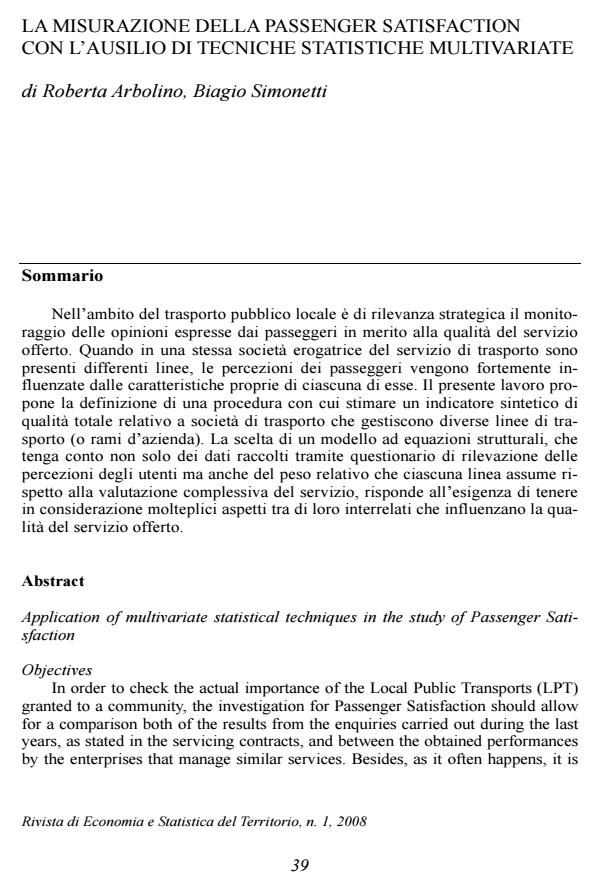La misurazione della passenger satisfaction con l'ausilio di tecniche statistiche multivariate
Titolo Rivista RIVISTA DI ECONOMIA E STATISTICA DEL TERRITORIO
Autori/Curatori Roberta Arbolino, Biagio Simonetti
Anno di pubblicazione 2008 Fascicolo 2008/1
Lingua Italiano Numero pagine 15 P. 39-53 Dimensione file 296 KB
DOI
Il DOI è il codice a barre della proprietà intellettuale: per saperne di più
clicca qui
Qui sotto puoi vedere in anteprima la prima pagina di questo articolo.
Se questo articolo ti interessa, lo puoi acquistare (e scaricare in formato pdf) seguendo le facili indicazioni per acquistare il download credit. Acquista Download Credits per scaricare questo Articolo in formato PDF

FrancoAngeli è membro della Publishers International Linking Association, Inc (PILA)associazione indipendente e non profit per facilitare (attraverso i servizi tecnologici implementati da CrossRef.org) l’accesso degli studiosi ai contenuti digitali nelle pubblicazioni professionali e scientifiche
Application of multivariate statistical techniques in the study of Passenger Satisfaction ABSTRACT: Application of multivariate statistical techniques in the study of Passenger Satisfaction Objectives In order to check the actual importance of the Local Public Transports (LPT) granted to a community, the investigation for Passenger Satisfaction should allow for a comparison both of the results from the enquiries carried out during the last years, as stated in the servicing contracts, and between the obtained performances by the enterprises that manage similar services. Besides, as it often happens, it is not possible to obtain these last objectives following to the different composition of the enterprises that are often in charge for more than one line. To this purpose this study aims at defining a procedure through which it is possible to identify such a synthetic marker related to transportation firms, as to be compared with other forms in absolute terms, taking into consideration that the observed lines cannot be considered equally important; therefore it seems viable to weigh them through scales that express their relative importance. Method and results The procedure has implied the use of statistical and economic methods through the Structured Equations Models (SEM). First it has been considered the influence of the simple contracts for each line related to the quality variables used by a PS research carried out in 2006 by a transport firm from Campania, managing three different lines. Subsequently, in order to take into consideration the composition of the three lines, it has been necessary to weigh the obtained values against the firm performance indicators. The global business value 0.68 gets a meaning that is different from the single quality markers obtained for each line (0.59, 0.29, 0.12). This value, comprised within the interval (0.1), allows to state that, on the whole, the firm taken into consideration presents a medium-high value for Quality. Conclusions The exploitation of the suggested methodology represents, in an internationally correctly-competitive market, not only a valid signal for the management of enterprises but it also plays the role of a monitor for the body that pays for the service. Only in this way it is possible to plan again the interventions against an objective feedback and to supply a useful basis for the evaluation at higher levels (national and regional). To this aim the choice of the model is of fundamental importance; first of all it makes homogeneous the firms managing public transports; secondly it supplies an aggregate marker for each of the firms that manage more lines and that carry out more PS enquiries; finally it selects and supplies both the markers used to weigh the firms and the appropriate forms (when the firm manages only one line).
Roberta Arbolino, Biagio Simonetti, La misurazione della passenger satisfaction con l'ausilio di tecniche statistiche multivariate in "RIVISTA DI ECONOMIA E STATISTICA DEL TERRITORIO" 1/2008, pp 39-53, DOI: